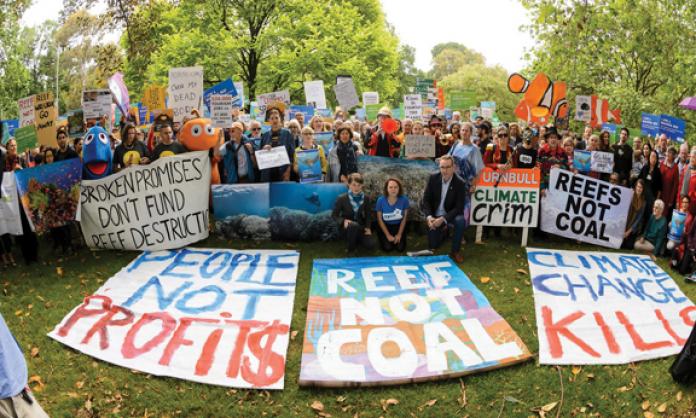A coalition of environment groups has joined forces to launch a campaign against the construction of Indian company Adani’s proposed coal mine at Carmichael in Queensland.
Once fully operational, the mine will be among the biggest in the world, with the potential annual carbon emissions from burning coal from the mine amounting to 128 million tonnes – equivalent to a quarter of Australia’s current emissions from fuel combustion.
The construction of the mine would be an act of environmental vandalism of catastrophic proportions. At a time when we’re witnessing only the early devastating impacts of climate change, the project would unlock a new, gigantic source of carbon – pushing the world further down the path towards the nightmare scenario of runaway warming.
Australia is already among the world’s biggest climate criminals. This would put it at the very top of the list.
Among other things, construction of the mine would likely put the final nail in the coffin of the Great Barrier Reef. The reef is under severe stress due to warming ocean temperatures and increasing acidification. Over the past two years, vast swathes of it have been killed by coral bleaching. Scientists predict that if these trends continue, the reef could die off completely within a few decades.
Saving the reef requires a rapid global shift away from fossil fuels. The construction of the Adani mine would take us in the opposite direction.
None of this, however, has been enough to convince Australian politicians not to back the project. In fact, the government seems positively gleeful at the prospect of signing the death sentence of the reef.
Resources minister Matt Canavan, in an ABC interview, claimed, “This project will be a net environmental plus for the world”. He labelled stories critical of the mine on the ABC and elsewhere “fake news”.
The government is so keen for the project to succeed that it is prepared to offer Adani a taxpayer-funded $1 billion loan for the construction of a rail link between the mine and the Abbott Point coal terminal on the coast. The loan was given conditional approval by the government’s Northern Australia Infrastructure Fund in December. Canavan and others have made clear their desire for the loan to be given final approval in the coming months.
The Labor Party hasn’t been much better. Bill Shorten baulked at supporting a $1 billion loan, but the project has his full support. And the state Labor government in Queensland has all but rolled out a red carpet for Adani.
Premier Annastacia Palaszczuk’s latest gift to Adani was to grant it an unlimited 60-year licence to draw water for the mine from the nearby Betts Creek formation. An environmental impact statement accompanying the licence predicts that by 2029 the mine will be using 26 million litres of water a day. Environmentalists and farmers worry this will have a lasting, detrimental impact on water flows into the Great Artesian Basin.
The water licence was signed off by the Queensland government the day after Cyclone Debbie devastated large swathes of the state’s northern coast. The irony, apparently, was lost on it.
On a recent visit to India to inspect Adani’s home port of Mundra, Palaszczuk was confronted by environmental campaigners who had lobbied Adani to abandon the project. Her response was to dismiss their concerns, saying, “All of you have jobs, and there are regional Queenslanders that are fighting for jobs [from coal mining]. Ten thousand regional jobs”.
The argument for “job creation” has been the mantra of both Coalition and Labor supporters of the mine. In making the case for government support for the rail line, resources minister Canavan pointed out the potential for new jobs to be created not only from the Carmichael mine but also from other mines that could be opened up in the area.
The rail link, Canavan claimed, “could be the corridor that opens up more than 15,000 direct jobs in mining in the Galilee Basin. The Galilee Basin stands to be a jobs bonanza for our country, the likes of which we haven’t seen since the Pilbara and the Bowen Basin were opened up in the 1960s”.
If anything is “fake news”, it’s this. Adani’s claim that its mine will create 10,000 jobs was undermined in court by its own expert witness, who said the real figure was fewer than 1,500. And any jobs created in the Galilee Basin should be balanced with the tens of thousands of tourism and other jobs that could be lost through the further destruction of the Great Barrier Reef.
Of course the real “business case” for the project isn’t about jobs. What it’s really about is profit. Adani will reap billions of dollars annually – much of which will be whisked away to a subsidiary it owns in the Cayman Islands, a tax haven. And the Queensland government hopes to receive $22 billion in royalties over the life of the mine.
With these kinds of mega-profits on the cards, it’s no wonder that politicians like Canavan and Palaszczuk are licking their lips. They’ll no doubt be richly rewarded for their services if they re-enter the world of business. And any lingering concern they might have for the reef might be assuaged by the fact that they’ll be among the few people who can afford to pay for the luxury of enjoying whatever remains of it in coming decades.









